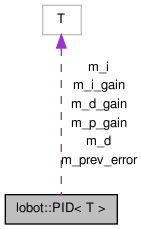

Simple implementation of a PID controller. More...
#include <Robots/LoBot/misc/LoPID.H>

Public Member Functions | |
| T | cmd (const T &error) |
| void | reset () |
| ~PID () | |
| Clean-up. | |
| void | p_gain (const T &g) |
| Re/setting the gains. | |
| void | i_gain (const T &g) |
| void | d_gain (const T &g) |
| void | gains (const T &p, const T &i, const T &d) |
| void | gains (const triple< T, T, T > &g) |
| T | p_gain () const |
| Retrieving the current gains. | |
| T | i_gain () const |
| T | d_gain () const |
| triple< T, T, T > | gains () const |
| PID (const T &p_gain=T(0), const T &i_gain=T(0), const T &d_gain=T(0)) | |
| Initialization. Clients should supply the gains to be used. | |
| PID (const triple< T, T, T > &gains) | |
Simple implementation of a PID controller.
This class implements a generic PID controller that doesn't really know anything about the control variable. Rather, it simply computes a command given the current error by keeping track of the P, I and D components of a PID controller.
This class is defined as a template. However, it is really meant to be used only with numeric types.
Definition at line 71 of file LoPID.H.
| T PID< T >::cmd | ( | const T & | error | ) | [inline] |
| T lobot::PID< T >::p_gain | ( | ) | const [inline] |
| void lobot::PID< T >::p_gain | ( | const T & | g | ) | [inline] |
| void lobot::PID< T >::reset | ( | ) | [inline] |
 1.6.3
1.6.3